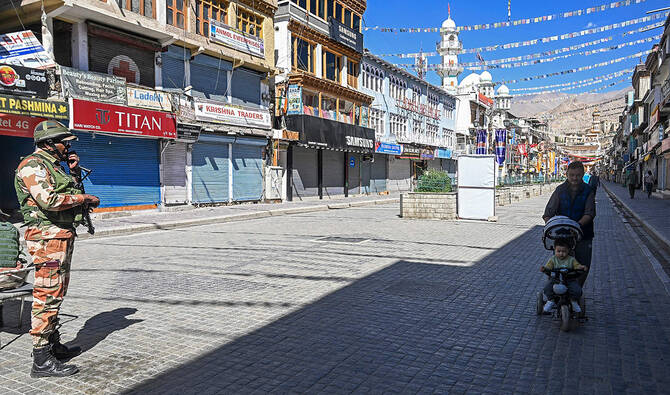Weeks after the September 24 protests and the killing of four civilians in Indian forces’ firing, Leh’s main market and tourist areas remain eerily silent, revealing a reality far removed from official claims of normalcy in the Ladakh region of Indian illegally occupied Jammu and Kashmir.
Hotels and guesthouses that once thrived on tourism are now deserted, with rates slashed from Rs 5,000–Rs10,000 to as low as Rs 500–Rs 1,000, yet still failing to attract guests, reports the English-language digital news portal of Jagran Prakashan Limited, a major Indian publishing house. Taxi stands lie empty, and the Leh town appears to host more Indian forces’ personnel than visitors.
“We’ve never seen such days before,” said Rigzin Wagmo Lechik, president of the Leh chapter of the All Ladakh Hotel and Guest House Association, was quoted by the Indian news protal . “Violence has robbed us of our season’s happiness. And yet, the Lieutenant Governor claims everything is normal. But nothing about our lives feels normal anymore.”
The economic impact has been severe. Lechik said that earlier incident in Pahalgam had already reduced tourism by 50%, but the latest violence has deepened the crisis, pushing losses to nearly 80%. Around 2,000 hotels and guesthouses remain vacant. “Tourism constitutes half of Ladakh’s GDP, and by October, bookings for next March and April usually begin. This year, not a single pre-booking has been made,” Lechik said. “In a few weeks, snow will shut down the region. If we cannot earn now, how will we survive the next six months?”
The portal said that internet services, suspended for 16 days following the September 24 killings, were restored late Thursday night after local protests, but no official notification was issued. Meanwhile, the district collector has warned of strict action against those spreading “fake news,” highlighting continued attempts to control the narrative.
Local residents and community leaders insist that the situation remains far from normal. “Section 163 prevents gatherings of more than five people. Schools have reopened, but classrooms are empty,” said Chering Dorje, co-chairman of the Leh Apex Body.
Taxi drivers face unprecedented idleness. Leh Taxi Union President Thinles Namgyal shared their concerns: “Since September 24, we haven’t had a single booking. About 6,000 taxi drivers are sitting idle. Families are struggling to make ends meet.”
The unresolved question of responsibility for the firing that killed four people during a peaceful fast led by social activist Sonam Wangchuk continues to haunt the community. While the Deputy Commissioner appointed an SDM to investigate, the Leh Apex Body has rejected the probe as biased, demanding a judicial inquiry.
Despite repeated assurances from authorities about calm and normalcy, Ladakh’s silent streets, shuttered businesses, and idle workers paint a starkly different picture — one of economic hardship, unanswered questions, and a community still waiting for justice.






